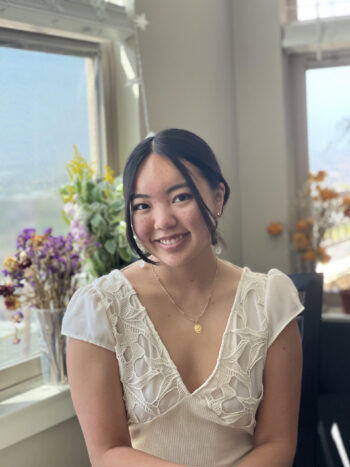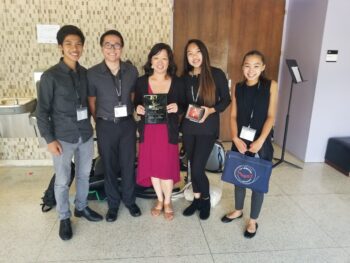Michelle Nguyen
Michelle Nguyen, class of 2018, began studying guitar at PCM in 2009. Her teachers included Connie Sheu and Felix Bullock. During her time here, she participated in LAYGO’s Stuttgart Tours in 2014 and 2018 and was a member of the guitar quartet, Sonos Quattuor. She has since graduated from the University of San Diego with a degree in Behavioral Neuroscience and is now pursuing her Master’s at Stanford University in genetic counseling. Over the summer we caught up with Michelle and she shared the impact studying music has had on her and what she hopes to come of her future.

What have you been up to since leaving PCM?
I just came back from a road trip with members of the Sonos Quattuor, our guitar quartet that started at PCM. When all four of us are in the LA area, we always make time to reconnect. And this time, our reunion materialized as a small trip up to the bay area! And later this summer, I am traveling to Germany and Italy with my lovely host family from the two times that I visited Germany with LAYGO and Guitarreando! I’ve never felt like I truly left PCM because the connections that I made still drive me today. More generally, I graduated undergrad in May and now I’m starting graduate school in the fall to become a genetic counselor.
What does a genetic counselor do and what inspired you to pursue that as a career?
Genetic counselors work with patients and health care professionals to understand the physiological and psychological impact of genetic disorders within individuals and their families. They do this by outlining patient history, recommending genetic testing, deciphering medical diagnoses and test results, and other fun stuff! Basically, they help you understand the genetics of your health and address any feelings that you may have in response to your health.
I love how genetic counseling allows you to engage in storytelling (learning about a patient’s unique family history), investigation (exploring different genetic disorders), and empathy (understanding that the same genetic disease will never affect two people in the same way).
What is your favorite memory at PCM?
I loved every performance with the Sonos Quattuor. One of my favorites was our series of performances during the European tour in 2018 with PCM’s Los Angeles Youth Guitar Orchestra and Guitarreando.
Picture a giant group of American and German guitarists driving for hours in a giant charter bus. We all came together as musicians. But first and foremost, we were young teens traveling across new cities and countries with old and new friends.
Imagine how much fun we had on those late nights when we’d walk to a viewpoint to talk and laugh so loudly, those long bus rides when we’d listen to all sorts of music and quickly learn the lyrics to the same songs, and those performances in the unexpected venues where we’d have to all squeeze together on a stage not fit for 30+ guitarists or rehearse in a seemingly haunted green room.
As a quartet, we had a whole line of performances to do without our coach, Connie Sheu. An entire two weeks of messing around, rehearsing, and performing, without Connie, was a big step for us. We learned so much from each other and grew so quickly. By the end of the tour, we were playing the best we ever have as a quartet and had the most fun we’ve ever had.

What do you think is the most valuable thing you learned from studying music?
Firstly, empathy. When playing music, I had the responsibility to convey the right emotions to listeners. However, over the years, I learned that I never want to impose a story or an emotion on a listener. Rather, I hope to walk with the listener to feel what I am feeling and invite them to find their own connection with the piece. I’m just one person who communicates one side of a story that others may or may not pick up. Empathy, inside and outside of music, drives connections.
Secondly, persistence. Of course, creating a deep connection to a piece and inviting listeners to join you requires a big part of you, emotionally. Realistically, I was not capable of this 100% of the time. So whenever I felt like I was playing guitar just to play, I thought that I didn’t have a true passion for music. But that wasn’t the case. I just didn’t have the right discipline. Passion can take you far, but discipline and persistence take you the rest of the way to ensure that your fire will never burn out. I’m still figuring out the balance between the two.
Do you still pick up the guitar every once in a while?
Yes I do! I started practicing again this summer and I’ve really enjoyed starting the whole learning process again, even with all the pain and frustration.
What are your goals for the future?
Continue doing fun things! It is so easy for me to get caught up in my career goals and I often overlook the experiences that bring me life. Specifically, PCM taught me that I can find life in a lot of unexpected places; gigs in the cold wind where my fingers feel so frozen that they can barely move, tough group rehearsals that don’t go smoothly, and even performances where I don’t live up to my expectations, are all growing experiences that I never could have gone through if I didn’t make space for doing things that I love. As I head into grad school and really immerse myself in the professional world, my goal is to maintain a longing for art.



